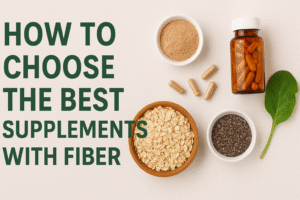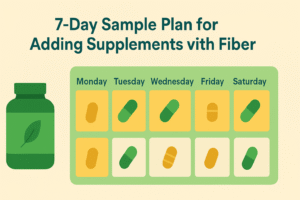Most people know that fiber is essential, but here’s the problem: research shows that nearly 95% of adults don’t consume enough of it daily. Fiber is linked to digestive health, cholesterol control, weight management, and blood sugar balance. Yet even with high fiber foods like beans, oats, and vegetables, many fall short. Supplements with Fiber (2025)
This is where supplements with fiber come in. They offer a convenient way to fill nutritional gaps without overhauling your entire diet. Whether it’s a fiber powder mixed into water, a capsule you take with breakfast, or a gummy for on-the-go convenience, these products are designed to boost your intake and support long-term health.
We’ll cover everything you need to know about supplements with fiber — the different types, benefits, side effects, and how to choose the right one for your needs.
What Are Supplements with Fiber?
Supplements with fiber are concentrated forms of dietary fiber available as powders, capsules, tablets, or gummies. They’re designed to help people bridge the gap between what they should be eating and what they actually consume.
There are two main types of dietary fiber:
Soluble fiber: Dissolves in water, forming a gel that slows digestion, helps lower cholesterol, and stabilizes blood sugar. Examples: psyllium husk, inulin, and beta-glucan.
Insoluble fiber: Adds bulk to stool, improving bowel regularity. Examples: cellulose, wheat bran.
Some fiber supplements also contain prebiotic fiber, such as inulin or resistant starch, which feed healthy gut bacteria. This supports microbiome diversity and leads to the production of short-chain fatty acids (SCFAs), beneficial for immune and digestive health.
Types of Supplements with Fiber and How They Work
Different supplements with fiber have unique properties:
Psyllium husk: One of the most effective fibers. It absorbs water, forms a gel, relieves constipation, lowers LDL cholesterol, and supports weight management by promoting satiety.
Inulin & FOS (fructooligosaccharides): Prebiotic fibers that nourish gut bacteria and may improve digestion and immunity. However, they can cause gas and bloating in sensitive individuals.
Methylcellulose: A synthetic fiber that is less fermentable, making it gentle for those with IBS since it causes less gas.
Wheat dextrin, acacia gum, calcium polycarbophil: Often added to powders and tablets; support mild stool-bulking and digestive health.
Beta-glucan and pectin: Known for cholesterol-lowering and blood sugar stabilizing effects.
These fibers come in powders, capsules, tablets, and gummies. Powders often deliver the highest fiber per serving, while gummies are easier to take but usually contain less fiber and added sugars.
Health Benefits of Supplements with Fiber
Scientific research highlights several benefits of using supplements with fiber:
Digestive Health & Constipation Relief: Psyllium husk is clinically proven to normalize bowel movements and improve stool consistency.
Cholesterol Reduction: Soluble fibers like psyllium and beta-glucan lower LDL cholesterol, supporting heart health. Mayo Clinic confirms soluble fiber reduces the absorption of cholesterol in the bloodstream.
Blood Sugar Control: Soluble fibers slow digestion, preventing blood sugar spikes. This is especially helpful for people managing type 2 diabetes.
Weight Management: Fiber increases satiety, which helps reduce overeating. Psyllium husk has even been nicknamed the “poor man’s Ozempic” for its appetite-suppressing qualities.
Gut Microbiome Support: Prebiotic fibers like inulin feed good bacteria, promoting better digestion and immunity.
How to Choose the Best Supplements with Fiber
When choosing supplements with fiber, consider:
Your goal: Psyllium for constipation, inulin for gut health, methylcellulose for IBS-friendly relief.
Form factor: Powders deliver more fiber; capsules and gummies offer convenience.
Label check: Look for grams of fiber per serving, and avoid products with too much added sugar.
Lifestyle fit: If you struggle with taste, capsules may be easier than powders.
Medical conditions: People with IBS, diabetes, or cholesterol concerns should match fiber type with their health needs.

How to Use Supplements with Fiber Safely
Like all health products, supplements with fiber work best when used properly:
Start small: Introduce 2–3 grams per day and increase gradually to avoid gas.
Stay hydrated: Fiber absorbs water; not drinking enough can worsen constipation.
Timing: Taking fiber with meals helps improve satiety.
Medication interactions: Fiber may reduce the absorption of certain drugs. Take medications 1–2 hours before or after fiber.
Side Effects & Who Should Avoid Supplements with Fiber
Most people tolerate supplements with fiber, but some may experience:
Gas, bloating, or mild cramps (especially with inulin or FOS).
Constipation is not paired with enough water.
People with strictures, bowel obstructions, or recent intestinal surgery should avoid fiber supplements unless cleared by a doctor.
supplements with fiber (2025) top picks for health care
Buying Guide for Supplements with Fiber
Before purchasing, check for:
Fiber type (psyllium, inulin, methylcellulose, etc.).
Fiber grams per serving.
Added sugar content (common in gummies).
Certifications (non-GMO, gluten-free, third-party tested).
Price per gram for value comparison.
7-Day Sample Plan for Adding Supplements with Fiber
Day 1–2: Start with 2–3 g psyllium mixed with water.
Day 3–4: Increase to half the recommended serving.
5–7: Full serving (5–10 g), paired with high fiber foods like oats and chia seeds.
Daily reminder: Drink at least 8 glasses of water.

Conclusion
Fiber is one of the simplest yet most overlooked nutrients for health. With most people not meeting daily recommendations, supplements with fiber offer a practical, science-backed way to support digestion, regulate cholesterol, and promote satiety.
Choosing the right product comes down to your goals and lifestyle — whether you need constipation relief, better gut microbiome support, or weight management. Start slow, drink water, and you’ll likely notice the benefits within days.
FAQs:
Q1: Can I take supplements with fiber daily?
Yes, daily use is safe and beneficial when combined with hydration.
Q2: Which fiber is best for constipation?
Psyllium husk is the most effective for relieving constipation.
Q3: Do supplements with fiber help with weight loss?
Yes, fiber improves satiety and slows digestion, which reduces overeating.
Q4: Will supplements with fiber cause bloating?
Some types like inulin, may cause gas; psyllium and methylcellulose are gentler.
Q5: Can they lower cholesterol?
Yes, soluble fibers such as psyllium and beta-glucan help reduce LDL cholesterol.
Q6: Do fiber supplements interfere with medications?
They can. Separate fiber intake from medications by at least 1–2 hours.

